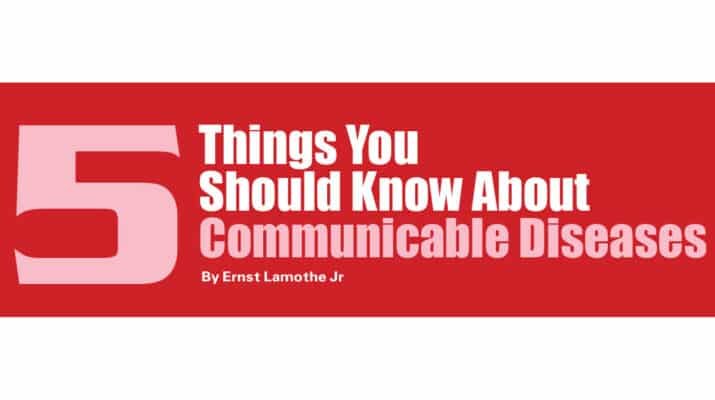By Ernst Lamothe Jr

In an increasingly interconnected world, communicable diseases have emerged as a pressing public health concern that demands attention.
With the rise of global travel and the intermingling of populations, the potential for disease transmission has never been greater. It’s vital for individuals to stay informed about these diseases to protect their health and that of their communities.
“Diseases can spread quickly across borders so staying informed about communicable diseases helps protect not just individual health, but the community as a whole.” said Debra Steves, interim manager of infection controls at St. Joseph’s Health. “Diseases like influenza, COVID-19, measles and even less-known illnesses can easily become widespread. Understanding the risks, transmission methods and preventive measures equips people to take action and minimize the chances of illness.”
Steves delves into various aspects of communicable diseases, shedding light on why they are a crucial topic today, the common diseases we face and the importance of education and vaccination in combating these health threats.
1. Common communicable diseases
Some of the most common communicable diseases include influenza, tuberculosis, HIV-AIDS and hepatitis. Influenza or the flu is highly contagious and spikes during colder months, affecting millions annually. Tuberculosis is a bacterial infection that primarily affects the lungs but can spread to other organs, while HIV-AIDS remains a significant global health challenge. Hepatitis, particularly types A, B and C, impacts liver health and can be spread through contaminated food, blood or sexual contact.
“While many of these diseases may seem far away or isolated, they can have local consequences, especially in densely populated cities,” Steves said. “Staying informed about communicable diseases is essential for protecting personal health, community well-being and public safety.”
2. Myths and misconceptions
One prevalent myth is that vaccinations are not necessary if you are healthy. In reality, vaccines bolster the immune system and provide crucial protection against serious diseases. Another misconception is that communicable diseases only affect certain populations, whereas they can impact anyone, regardless of age or background. Dispelled myths can lead to a better understanding of disease prevention.
“I have also heard people say you can only get sick if you are in close contact with someone who is sick. While direct contact is a common way diseases spread, many communicable diseases can also be transmitted via contaminated surfaces or the air. It’s crucial to practice good hygiene and cleaning habits,” she added.
3. Importance of vaccinations
Experts say vaccinations are a cornerstone of public health and play a critical role in preventing the spread of communicable diseases. They work by training the immune system to recognize and fight off pathogens before they can cause illness. By achieving widespread vaccination coverage, communities can establish herd immunity, protecting those who cannot be vaccinated due to medical reasons.
“Vaccines are rigorously tested for safety and efficacy. The side effects are usually mild and temporary and their benefits far outweigh the risks. Vaccines are one of the best tools we have to prevent serious illness and outbreaks,” said Steves.
4. Vaccination a hot topic
The discourse surrounding communicable diseases has intensified in recent years, especially due to the COVID-19 pandemic, which brought global attention to public health practices and the importance of disease control. Increased travel and global interactions also mean that diseases can emerge and spread more quickly than ever. Vaccine misinformation has created divisions in public opinion, making it essential to combat false narratives with facts and education.
“The conversation around communicable diseases is more important than ever, especially with the resurgence of diseases like measles in certain areas,” she said. “Over the last few years, there have been several outbreaks of measles in the U.S., including in New York. These outbreaks have been tied to pockets of unvaccinated populations, highlighting the importance of maintaining high vaccination rates. Vaccinations are one of the most effective ways to prevent the spread of communicable diseases.”
5. Tips to staying away from contracting various communicable diseases
Practicing good hygiene is one of the most effective ways to prevent the spread of communicable diseases. This includes regular hand washing with soap and water, using hand sanitizers and avoiding close contact with sick individuals. Maintaining a healthy lifestyle, including regular exercise, a balanced diet and adequate sleep also strengthens the immune system. Additionally, staying informed about public health guidelines, particularly during outbreaks and ensuring vaccinations are up to date are crucial steps in safeguarding one’s health.
“Staying healthy and minimizing the risk of contracting communicable diseases requires good hygiene, common sense and preventive measures,” she said “Use common sense hygiene such as washing your hands regularly, using hand sanitizer, wearing masks when necessary and avoiding close contact with sick individuals.”

